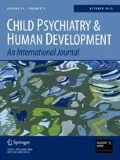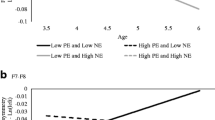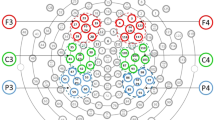Abstract
EEG activity, empathic reactions to emotion-inducing stimuli, and the ability to complete a teaching task were examined in preschool children of depressed and non-depressed mothers. EEG activity from frontal and parietal regions was recorded. Repeated measures MANOVAs indicated that the children of depressed mothers had greater relative right frontal EEG asymmetry, a pattern that typically accompanies greater negative affect and showed less empathic responses to a crying infant as well as to their own mothers' simulated distress. Children of depressed mothers were slower in completing the teaching task (involving mutual cooperation with their mother) and they spent more time asking for help than children of non-depressed mothers. Further, the depressed mothers stated their approval less often and spent less time helping their child complete the task.
Similar content being viewed by others
References
Cohn J, Matias R, Tronick E, Connell D, Lyons-Ruth, K: Face-to-face interactions of depressed mothers and their infants. In: Maternal Depression and Infant Disturbance. ed. Tronick E, Field T. San Francisco CA: Jossey-Bass, 1986.
Field T: Infants of depressed mothers. Inf Behav and Developm, 18: 1-13, 1995.
Downey G, Coyne JC: Children of depressed parents: An integrative review. Psych Bulletin, 108: 50-76, 1990.
Field T, Sanberg D, Goldstein S, Garcia T, Vega-Lahr N, Porter K, Dowling M: Play interactions and interviews of depressed and conduct disorder children and their mothers. Child Psychiat and Hum Developm, 17: 213-233, 1987.
Lundy B, Field T, Pickens J: Newborns of mothers with depressive symptoms are less expressive. Inf Behav and Developm, 19: 419-424, 1996.
Field T: Early interactions between infants and their postpartum depressed mothers. Inf Behav and Developm, 7: 517-522, 1984.
Field T: Infants of depressed mothers. Developm and Psychopath, 4: 49-66, 1992.
Field T, Lang C, Martinez A, Yando R, Pickens J, Bendell D: Preschool follow-up of children of dysphoric mothers. J of Clinical Child Psychiat, 25: 275-279, 1996.
Lee C, Gotlib I: Maternal depression and child adjustment: A longitudinal analysis. J of Ab Psych, 98: 78-85, 1989.
Field T, Fox NA, Pickens J, Nawrocki T: Relative right frontal EEG activation in 3-to 6-month-old infants of depressed mothers. Developm Psych, 31: 358-363, 1995.
Jones NA, Field T, Fox NA, Lundy B, Davalos M: EEG activation in one-month-old infants of depressed mothers. Developm and Psychopath, 9: 491-505, 1997.
Jones NA, Field T, Davalos M, Pickens J: Stability of EEG in infants/children of depressed mothers. Child Psychiat and Hum Developm, 28: 59-70, 1997.
Frankel KA, Lindahl K, Harmon RJ: Preschoolers' response to maternal sadness: Relationships with maternal depression and emotional availability. Inf Mental Health J, 13: 132-146, 1992.
Radke-Yarrow M, Zahn-Waxler C, Richardson DT, Susman A, Martinez P: Caring behavior in children of clinically depressed and well mothers. Child Developm, 65: 1405-1414, 1994.
Eisenberg N, Schaller M, Fabes RR, Bustamante D, Mathy RA, Schell R, Rhodes K: Differentiation of personal distress and sympathy in children and adults. Developm Psych, 24: 766-775, 1988.
Eisenberg N, Miller PA: The relation of empaty to prosocial and related behaviors. Psych Bulletin, 101: 91-119, 1987.
Zahn-Waxler C, Friedman SL, Cummings EM: Children's emotions and behaviors in response to infants' cries. Child Developm, 54: 1522-1528, 1983.
Hollingshead AB: Four Factor Index of Social Skills, 1975.
Radloff L: The CES-D: A self-report depression scale for research in the general population. Applied Psych Measure, 1: 385-401, 1977.
Achenbach TM, Edelbrock CS: Parent's Report Form. Burlington, VT: Author, 1986.
Conners CK: The Conner Rating Scales: Instruments for the Assessment of Childhood Psychopathology. Unpublished manuscript. Children's Hospital National Medical Center. Washington D.C., 1985.
Davidson RJ: EEG measures of cerebral activation: Conceptual and methodological issues. Intern J of Neuroscience, 39: 71-89, 1988.
Tomarken AJ, Davidson RJ, Wheeler RE Kinney L: Psychometric properties of resting anterior EEG asymmetry: Temporal stability and internal consistency. Psychophysi, 29: 576-592, 1992.
Fox NA, Rubin KH, Calkins SD, Marshall TR, Coplan RJ, Porges SW, Long J, Stewart S: Frontal activation asymmetry and social competence at four years of age. Child Developm, 66: 1770-1784, 1995.
Dawson G: Development of emotional expression and emotion regulation in infancy. In: Human Behavior and the Developing Brain. ed. Dawson G, Fischer KW. New York: Guilford Press, 1994.
Fox NA: If it's not left, it's right: Electroencephalogram asymmetry and the development of emotion. Amer Psych, 46: 863-872, 1991.
Fox NA: Dynamic cerebral processes underlying emotion regulation. In: The development of emotion regulation: Biological and behavioral considerations. Monographs of the Society for Research in Child Development. ed. Fox NA, 59: (Serial No. 240), 1994.
Jones NA, Field T, Fox NA, Davalos M, Lundy B, Hart S: Newborns of mothers with depressive symptoms are physiologically less developed. Inf Behav and Developm, 21: 537-541, 1998.
Lundy BL, Jones NA, Field T, Nearing G, Davalos M, Pietro PA, Schanberg S, Kuhn C: Prenatal depression effects on neonates. Inf Behav and Developm, 22: 119-129, 1999.
Eisenberg N: Empathy and related emotional responses. In: New Directions for Child Development, 44: San Francisco CA: Jossey-Bass, 1989.
Fisher L, Kokes RF, Harder D, Jones JE: Child competence and psychiatric risk: IV. Summary and integration of findings. J of Nerv and Mental Disease, 168: 353-355, 1980.
Author information
Authors and Affiliations
Rights and permissions
About this article
Cite this article
Jones, N.A., Field, T. & Davalos, M. Right Frontal EEG Asymmetry and Lack of Empathy in Preschool Children of Depressed Mothers. Child Psychiatry Hum Dev 30, 189–204 (2000). https://doi.org/10.1023/A:1021399605526
Issue Date:
DOI: https://doi.org/10.1023/A:1021399605526




